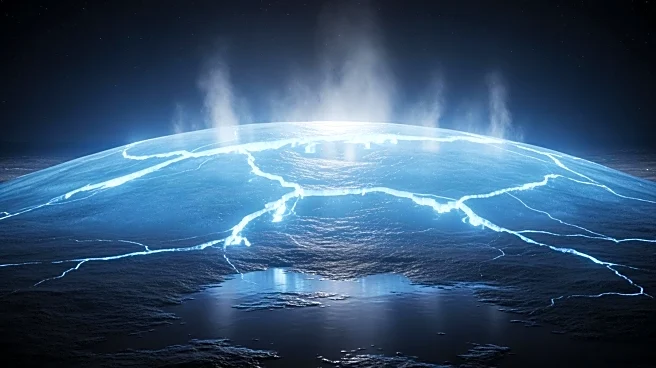What's Happening?
Recent studies have indicated that small icy moons in the outer solar system, such as Saturn's Enceladus and Uranus's Miranda, may harbor boiling oceans beneath their surfaces. This phenomenon occurs when the icy shells of these moons thin, reducing the pressure
on the oceans below. The pressure can drop enough to reach a 'triple point,' where ice, liquid water, and water vapor coexist, potentially leading to boiling at low temperatures. This discovery is significant because it suggests that these moons could be prime locations to search for extraterrestrial life, as life on Earth is often found wherever there is water. The research, led by geophysicist Maxwell Rudolph at the University of California, Davis, explores the forces that result from changes in the thickness of the icy shells over millions of years, which could lead to cracks connecting the surface to the subsurface ocean.
Why It's Important?
The potential for boiling oceans on icy moons is crucial for understanding the conditions that might support life beyond Earth. These moons, with their hidden oceans, could be among the best sites in the solar system to search for extraterrestrial life. The study highlights the importance of these moons in astrobiology, as they may offer environments where life could exist despite extreme conditions. The findings also suggest that the geological features observed on these moons, such as cracks and ridges, could be linked to the thinning and re-thickening of their ice shells. This research could guide future missions aimed at exploring these moons, providing insights into their potential habitability and the processes that shape their surfaces.
What's Next?
Future research will focus on understanding the effects of gases released from boiling oceans, including the formation of clathrates, which are complex icy structures that trap gas molecules. Scientists aim to investigate what happens to these gases once released and the types of surface features that might form as a result. This could provide further clues about the moons' geological history and their potential to support life. Additionally, space missions targeting these moons could be designed to explore their subsurface oceans and assess their habitability, potentially leading to groundbreaking discoveries in the search for life beyond Earth.
Beyond the Headlines
The study of icy moons and their potential boiling oceans raises ethical and scientific questions about the search for extraterrestrial life. It challenges our understanding of life in extreme environments and the conditions necessary for its existence. The research also underscores the importance of protecting these celestial bodies from contamination during exploration, ensuring that any potential life forms are not disturbed by human activity. As scientists continue to explore these moons, they must consider the implications of their findings for our understanding of life and the universe.
















